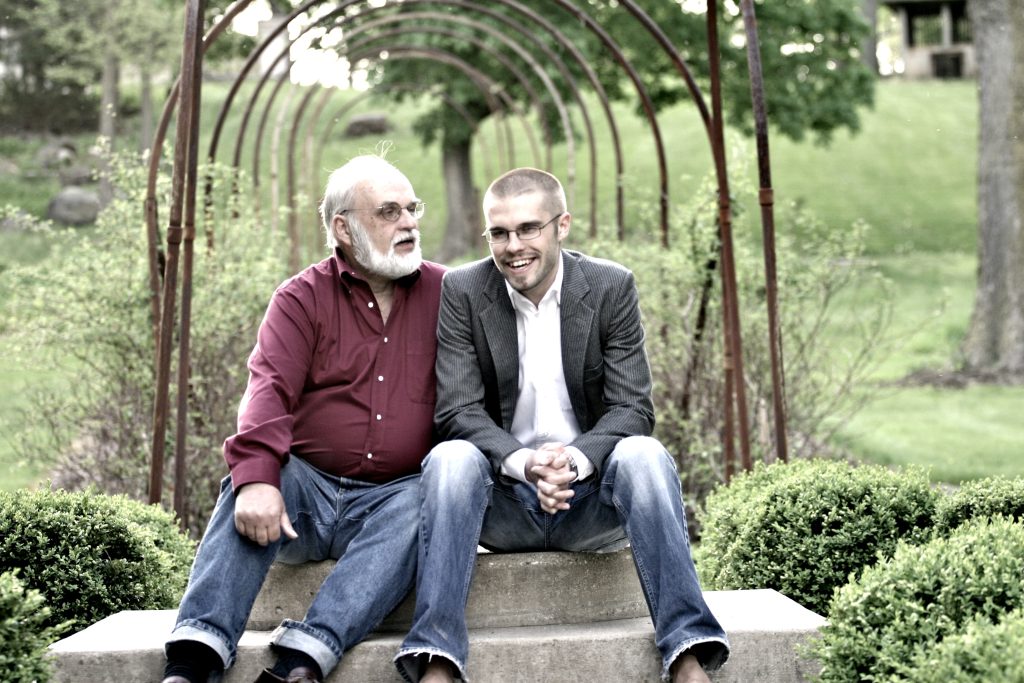Dear friends,
Today marks seven days since my dad – Joseph James DeCort Jr. – died (February 9, 1944 – April 27, 2024). It’s a kind of sabbath in this new world with(out) my dad living in it.
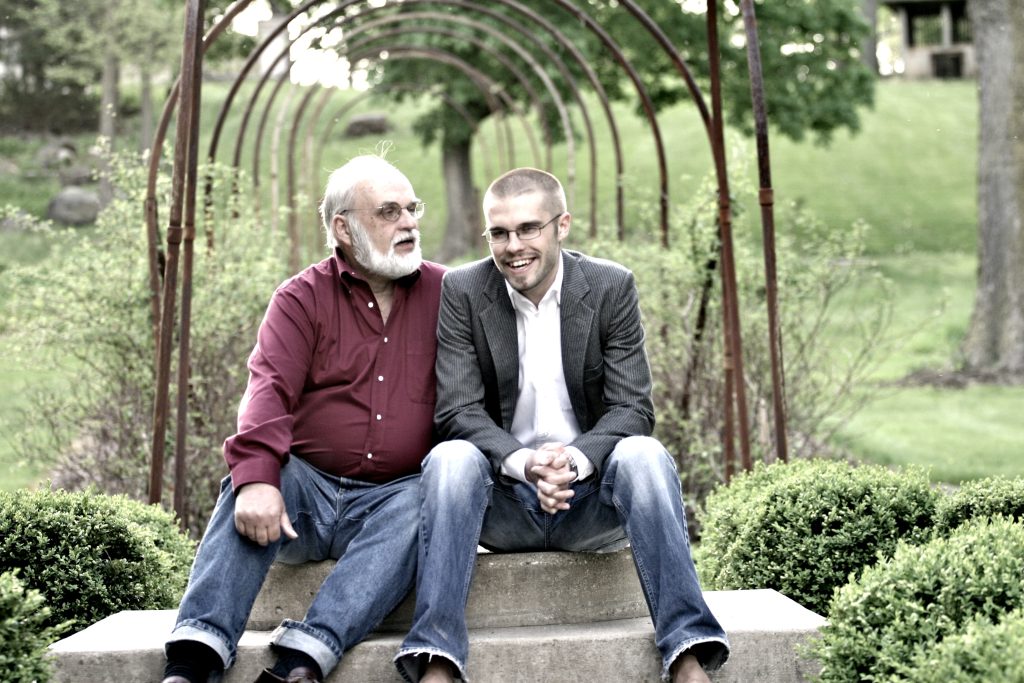
I won’t simply call it a world “without” dad, because I don’t believe that. He’s still here, with us, near us — but in a different way that’s more mysterious and difficult to access and discern.
When I walked on the prairie path the day after he died, I felt the wind on my body and told Padre, “I feel like you’re close to me; you’re in the wind now.” And I knew that to be true. I could feel his presence on my skin, even as I often wake up with a dull sense of absence now.
He went home to his Creator a week ago on April 27 at 9:14pm due to cardiac arrest. He had gotten the flu and fell out of bed on April 18. After ten precious days of what seemed might be a slow, gradual recovery, dad’s heart suddenly gave out, and he completed his earthly journey.
I want to thank so many friends who have prayed for my dad, my family, and Lily and me during this very vulnerable, heart-splitting, life-expanding, sacred time. Thank you for your many messages of love, comfort, and appreciation for my dad. Special thanks to all of the hospital staff who struggled for his life.
In tribute to my dad on this seventh day, I want to tell a story of God’s faithfulness woven throughout my dad’s life and death. After writing this, I found that it had unfolded in seven parts, which feels like another example of what this story is all about. It’s a story of mysterious gifts, smiles, and laughs from heaven in the midst of death and dying. For me, it’s a story of hope beyond my understanding — the story I believe more than any other in which God gets the last laugh and we will all laugh together, healed by joy, forever.
I. War
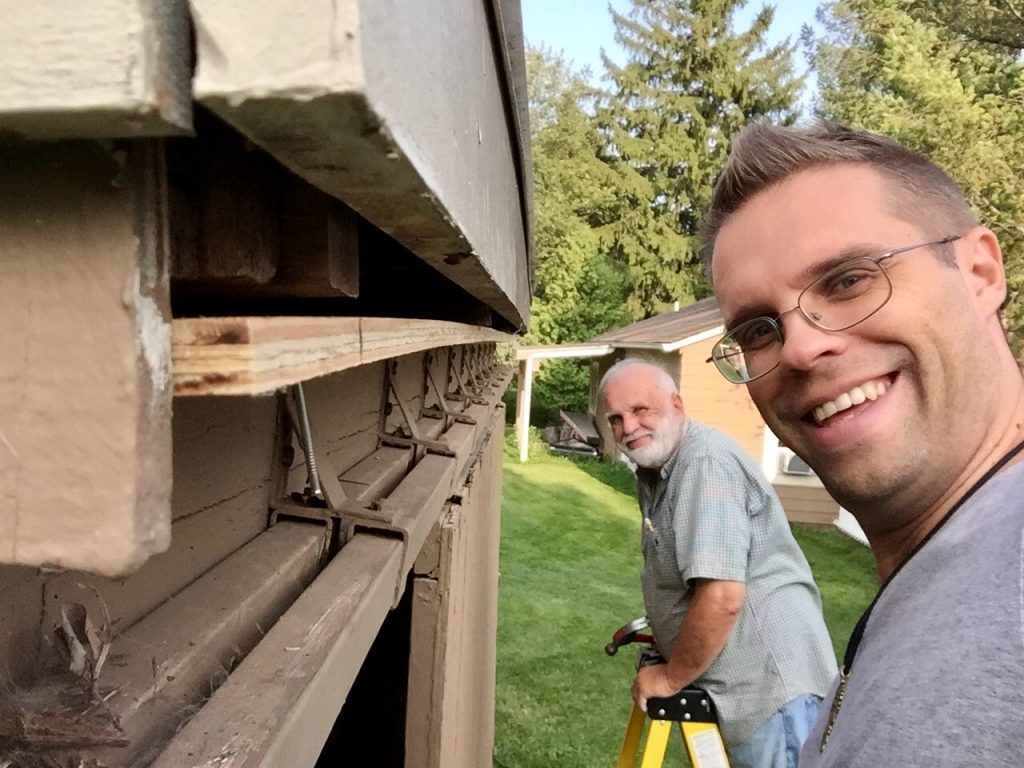
Three years ago, civil war was ravaging Ethiopia. The death, destruction, and displacement were hellish — the most catastrophic conflict of the 21st century, more deadly than Ukraine and Gaza combined. I was living in Addis Ababa and receiving gruesome death threats for my commitment to peacemaking and seeing “the enemy” as our neighbor.
It’s a long and painful story; I tell some of it in my new book, which will be released in September. But three years ago, it became clear that it was time for Lily and me to transition from Ethiopia and move to Chicago.
This transition felt like an exile. It was painful and disorienting and terrifying. So much of Lily’s and my life was (and is) deeply rooted in Ethiopia. But leaving home for home meant that I got three more years with my dad.
I didn’t know that he was dying then. But for the last three years, I had the precious gift of being near my dad, serving him as he grew weaker, enjoying his company almost every day, riding with him in the ambulance to the hospital, and sharing one last conversation with him soon before he died. (I write about that conversation here. In brief, my dad said, “Let’s go home,” told me a joke, and we smiled/laughed together one last time.)
The Ethiopian civil war was and is a grave evil. It should never have happened, and it devastated the lives of millions of our precious neighbors. Nothing can make it any less terrible.
But in a mysterious mercy I will never understand, the war and the death threats I got for advocating for peace also meant that I got three unexpected years with my dad. These years turned out to be his last and some of our most precious together.
Maybe that’s what death and heaven will feel like for all of us — a terrible tragedy that is ultimately held in goodness and healed with gratitude.
I carry the victims of Ethiopia’s civil war, Ukraine, and Gaza in my heart as I grieve my dad’s death. I pray for all the grieving each night when I tuck my mom into bed like dad always used to do. May war end and nonviolence flourish throughout the earth.
II. Fear
When last year began, I found myself on my hands and knees beside my bed at night. I was overwhelmed with the fear of being abandoned or rejected by people I love. I felt so burdened that all I could do was cringe on the floor in desperate prayer.
As I struggled to make sense of this fear, I began to wonder if it was a warning that one or both of my parents were about to die.
That fear almost crippled me. And I never thought I’d say this. But now I’m grateful for that fear. Again, in a mysterious way that exceeds my understanding, it attuned me to being very intentional in the way I spent time with my dad. It removed any apathy or passivity in my relationship with him.
I would go over to dad’s house and simply sit with him and do puzzles with him. Lily and I took my parents out for dinners and cooked for them. We did lots of projects around the house together and went to cancer appointments together. We intentionally stayed home to cook and celebrate Christmas with my parents, even though dear friends generously invited us to celebrate with them. I was aware that our time might be limited, and so it was.
Here today, a week after my dad died, I see my fear in 2023 as a strange grace that I cherish. It was difficult for me to process. It nearly killed me. But it oriented me to the final year of my dad’s life and made me extra-attentive and present to him.
I live now in the world with(out) my dad but without regrets. I made the most of dad’s final months on earth. We savored our time together and had no unfinished business.
“Do not be afraid.”
III. Fire
My dad had a massive burn pile in his backyard. (I’ve written about it before here.) It grew more and more mountainous through the years. Last November, it just became clear to me that it was time for us to burn it down.
And we did. Dad and I got the flame thrower out, and we lit that massive pyre. The flames rose up to the tree tops, and we spent a lot of time together stoking that fire, tending it, and watching it blaze. It was our last major project together.
Over the years, I’ve discovered how grounding it is for me when an external object or event helps me make sense of something intangible happening inside of me. Some call this “alignment” or “synchronicity.”
In many ways, this fire was exactly that – an external object and event that helped me, retrospectively, to make sense of something unfolding inside of my life. Dad was getting ready to die. I was getting ready to survive his death. And this massive fire symbolized this impending reality in such a profound, tangible way. A clearing was coming, and it would be unbearably hot and undeniably beautiful. It would leave me needing to dig through the layers of ash and tend the soil, so new life could emerge through the ashes. In many ways, this is what I’ve been doing for the last seven days.
Remembering the fire also makes me laugh. Dad could have an extremely dark sense of humor. When I talked with him about dying, he loved cracking jokes about it. He typically referred to dying as “croaking.” When I asked him how he wanted to be buried, he said, “Put me in the burn pile!”
I remember laughing through my tears when dad said that to me on January 21, 2019. I’m laughing again now. Humor was his way of lightening the heaviness, of saying, “It’s going to be okay” when he knew we were afraid or hurting.
I look back on that massive bonfire, and I see it as a gift from God. Dad and I spent time together, then and there. But we also performed together what was coming — a massive letting go, a burial in fire (dad is being cremated), a new beginning with pain and beauty, ash and new life.
IV. Lily and the Half-Dead Tree
This fourth moment in my story of God’s faithfulness astonishes me more than the others somehow.
A few days before dad got sick and fell out of bed, Lily made a new painting. At the time, she didn’t know why, but she knew that she needed to make this specific image. In fact, she tried to make a similar image, but this importantly different image is what emerged.
On Lily’s canvas, the face of Jesus rests over the top of a tree. Half of the tree is green and bursting with life. Half of the tree is desiccated and clearly dead. A beam of light washes over both sides of the tree from above Jesus’s face. It symbolizes that Jesus is with us in life and death. Importantly, Jesus’s face is turned toward the dead half of the tree, giving his countenance to the darkness. His eyes are closed, and it looks like he is at peace but crying.
At the time, Lily had no idea that dad would get sick, that he would fall, that he would die. None of us did. But when we got home from the hospital after dad died a week ago, Lily’s painting was there right beside our bed. I laid down and that’s what I saw greeting me: Jesus’s face resting over the dead half of the tree and the light of his presence washing over the lifeless branches, subtly promising new life.
In that moment, I realized that Lily had painted a prophetic image of what was coming and what it would mean. Like the bonfire, she had given me a sacred icon for how to see and understand this life-changing event in my journey. Half of the trunk of my life had fallen into death, but Jesus was calmly beholding this and casting imperishable light and a healing tear upon it.
“There is a covenant of tears with God, and this covenant is not seen, is not heard, except by he who sees in secret and understands from afar. But it is a covenant in salvation with the God who will wipe away the tears.” Søren Kierkegaard
V. Friendship (Dave and Roger)
C.S. Lewis wrote that friendship is “the greatest of worldly goods,” and I believe this is true. I am amazed by how God orchestrated my dad’s death to be bookended with cherished friendship.
Two days before my dad fell, my dear friend and pastor Dave Schmidgall was visiting Chicago from D.C. His trip was already planned, and we had no idea that dad’s life was about to end. But Dave went out of his way to visit my parents with me. And it turns out that Dave was my last friend to spend time with my dad and me on this earth. I took a picture of that moment because it was so special to me (dad was getting ready to wash mom’s hair in the sink).
Dave described it like this in a text message after dad died:
“Your dad had a grin when I saw him. After many years since seeing him….he went right into a playful routine as if we’ve been seeing each other all the time. I noticed that. He skipped the pleasantries and went right into a flow.”
That was dad. And it was a precious gift to me that I got one more moment with him and one of my dearest friends. Thank you for being with us, Dave.
Then last night, my dear friend Roger Sandberg flew into Chicago from Oregon. Like Dave, his trip was already planned long before dad got sick. But it just “happened” to synchronize with my need for presence in this time.
Roger stepped through my door, gave me the biggest hug, told me he loved me, and we sat for several hours into the night and processed my dad’s life and death together. I also got to witness new life in Rog during a time of transition in his own life. It felt like breathing new oxygen, new hope. Rog also helped me see how the bonfire last year was a symbolic preparation for my dad’s death. Thank you, Rog!
What are the chances that two of my dearest friends would just happen to be in town right before and right after my dad died?
I am grateful, and I see the mysterious faithfulness of God in this synchronicity. (As I write this, I just heard our local barn owl hooting. We call him Spencer, and my dad always loved hearing him hoot. Spencer seems to show up at special moments, but I don’t remember ever hearing him hoot during the day before now. Hi, Spencer.)
VII. Mac N Cheese and Cookies (Joelle and Mark)
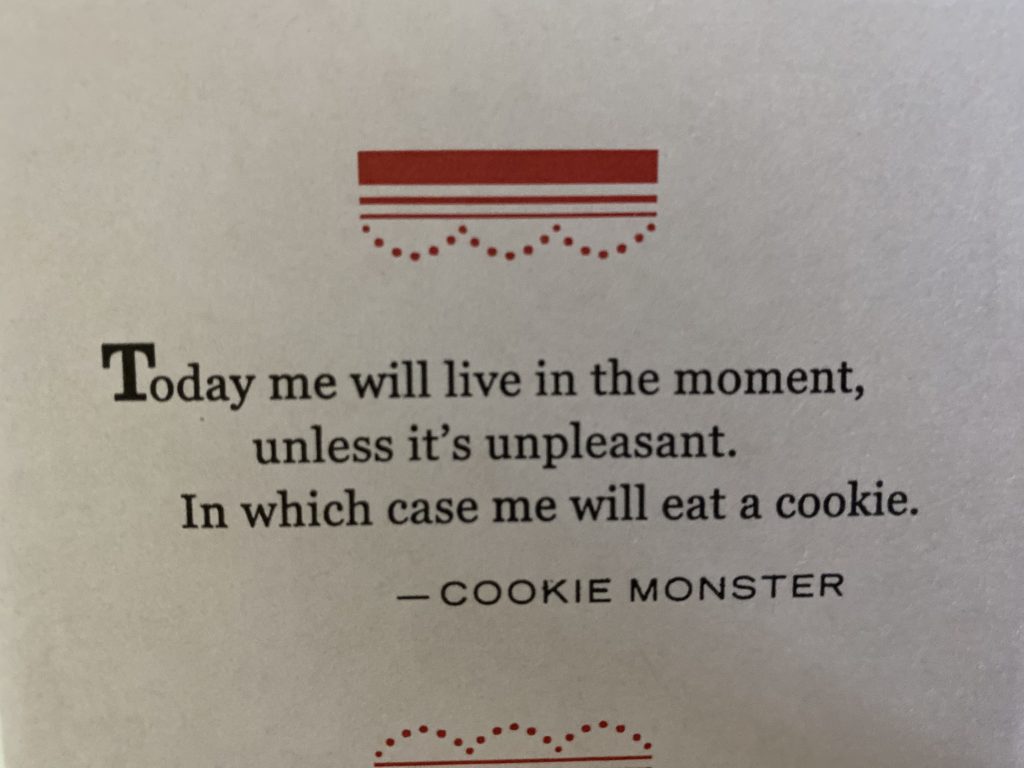
Another synchronicity or faithfulness happened in this week of new creation, of grieving and celebrating Padre. Yesterday around lunch time, I was hungry. I went over to my mom’s house to check on her, and there was a package sitting on the steps.
It was from my dear friends Mark and Joelle. The beautiful box from Love by the Spoonful was full of mac n cheese and cookies, and it made me cry. Mac n cheese is one of my favorite foods (they didn’t know that!), and cookies were one of my dad’s favorite “foods.” My niece Liliana had told me the day before, “Grandpa didn’t eat lunch! He snacked and ate cookies!” Yepperoo.
When I was hungry, one of my favorite foods and one of my dad’s favorite “foods” was siting on the steps waiting for me from some of my dearest friends on earth. I opened the box, read their card (“Much love to you as you grieve!!”), shed some tears, and sat down to eat mac n cheese and chocolate chip cookies for lunch.
Being loved always feels new to me, like a miracle from heaven. I’ve often noticed in the Harry Potter story how Rowling has the characters eat sweets in especially stressful moments. I never personally eat sweets during the day, but dad did. And yesterday was just what I needed. Mark and Joelle, thanks for that miracle. (Dearest Kate and BitterSweet family, thanks as well for the miracle you sent, along with Liz and Eric, Lauren and Landon, Gio and Season, Matt and Terry, and many others.)
The quotes on the boxes were so uncannily dad:
“Today me will live in the moment, unless it’s unpleasant. In which case, me will eat a cookie.” Cookie Monster
“One of the secrets of a happy life is continuous small treats.” Iris Murdoch
“We cannot all do great things but we can do small things with great love.” Mother Teresa
VII. “How Smooth You Play” on Holy Saturday
And now today — the seventh day, the seventh faithfulness, a sabbath.
Like every day since my dad died, my mom called me today around 7:30am and said, “I’m ready to get up.” After her stroke in 2013, dad always helped mom with her morning routine. He was her full-time caretaker for the last decade. That’s now become my responsibility for the time being — getting her up, making her coffee, arranging her pills, feeding her dog Lulu, holding mom’s hand, making her oatmeal and toast.
Since dad died, I’ve been compiling a list of all the playful, funny things dad would say — nicknames, jokes, puns, sayings. I have over 150 items on my list now. I’ve laughed a lot making it – maybe even laughed more than I’ve cried.
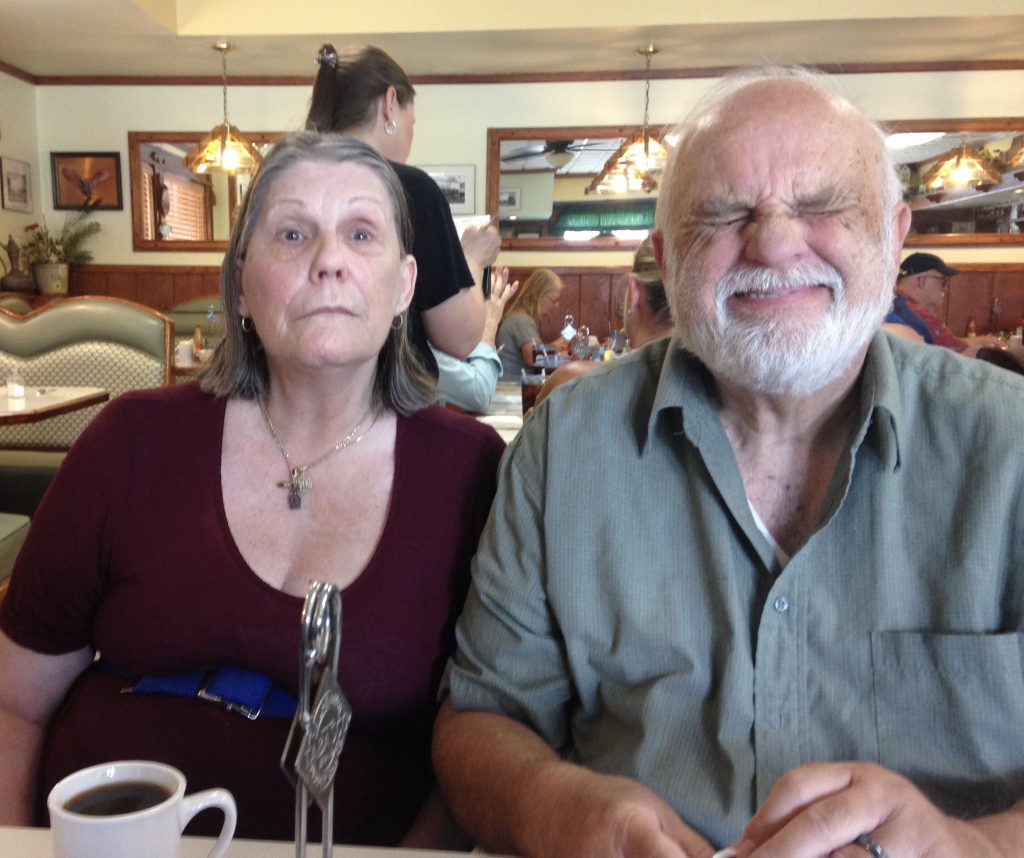
It gives me special pleasure that I don’t even know what some of them mean — like “vernalspastichord” and “wuzzer.” Dad loved playing with language. It’s how he expressed himself and showed affection to us and to total strangers. It was who dad was, diverging from conventional meaning or what we could intellectually understand but still real and meaningful precisely as such.
After a week of trying to record dad’s sayings, I thought that I might have gotten them all captured. But this morning as I walked through dad’s gate to take care of mom one more time, I said, “Good morning, Padre.” And then my dad’s voice popped into my mind and I heard, “How smooth you play!”
Dad loved saying this. It was his typical response when we fumbled something or life didn’t go according to plan. It was his way of bringing levity and laughter to awkward situations that could be unsettling or angering. And it was so dad: evoking playfulness instead of perfectionism, a joke instead of a judgment.
Hearing “How smooth you play” this morning felt like a little laugh from heaven — like when I walked in the prairie and felt the wind on my skin and told dad, “You’re in the wind now” and knew it was true.
Last night, Roger was talking to me about how we white Americans have such a materialist view of life and death. When someone is alive, all we talk often about is “what’s next.” When someone dies, we see them as gone and “move on.” But other people like Native Americans and the Japanese see their ancestors as still present and with them.
Roger rightly said that Christian faith aligns with these cultures in our vision of the dead as “a great cloud of witnesses.” Our ancestors are still alive, and they subtly encourage us to press deeper into faith on our earthly journey. (Rog and I laughed hard thinking about dad overhearing our conversation and cracking a joke about the two of us sitting around and talking about him late into the night.)
“How smooth you play” — that would be my dad’s way of saying to press deeper into faith a week after his death. It was like he was talking to me, telling me another joke in response to my “Good morning, Padre.” Keep playing. Let go of perfectionism. Have fun. Sabbath.
Dad has transitioned to that other dimension of reality now. But he isn’t gone. The world is more complex and richer than we often imagine or experience. I savor this, even as I grieve.
One last synchronicity, another divine wink: Today is Holy Saturday in Ethiopia.
Holy Saturday is a very significant holiday in my faith as a follower of Jesus. It’s the day between Good Friday and Easter Sunday. It’s the day when nothing happens. The day when the murdered are dead and the grieving are grieving. It’s the day when everything seems to have come to an end, the day strung out between total agony and everlasting hope, the dull but acute tension point.
I’ve often thought that all of history is one, long Holy Saturday — that liminal time between creation’s beginning and resurrection when we feel the ache and anticipation, the crushing despair and irrepressible hope of being human in this world that God has made and loves and entered into as Jesus.
For me, there’s something lovely about the seventh day — the sabbath — of my dad’s death being Holy Saturday in Ethiopia. Dad never visited Ethiopia and didn’t know much about Ethiopia. But it’s my second home. And dad loved Lily and her family so much. Lily was the last person that he asked about in our final conversation. Dad also kept a plaque from my dear friend Tekalign next to his bedside that said in Amharic “Enamesegenalen” (“We Thank You”). This was so appropriate: a bit of Ethiopia, a sign of presence across the distance, a word of gratitude that sat above the place where he fell.
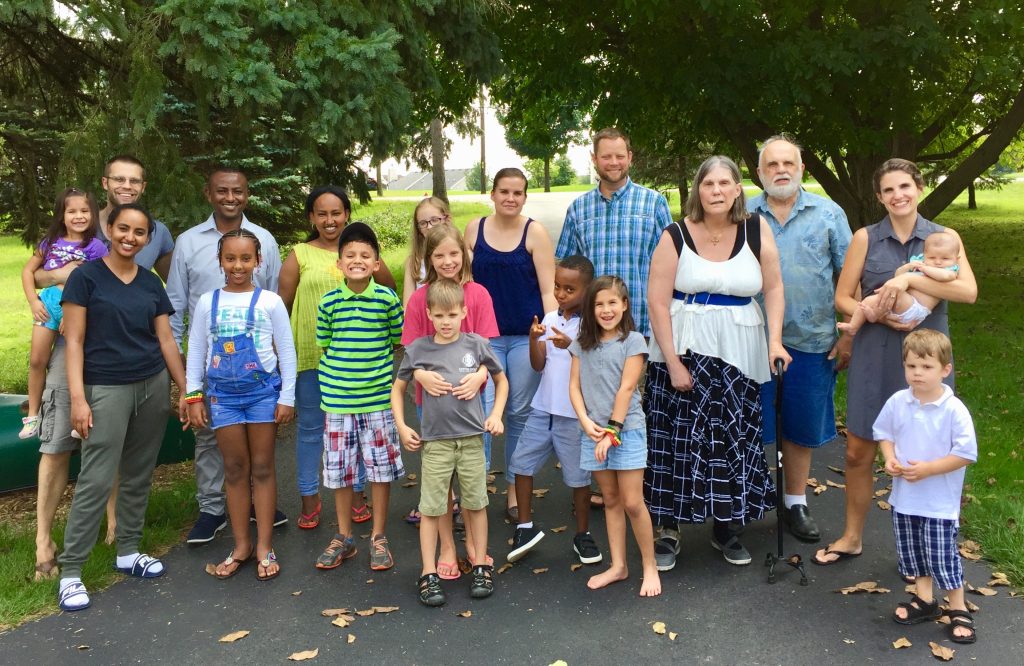
Yesterday was Good Friday in Ethiopia; tomorrow is Easter. Today is when we live — now, a Saturday just like any other, but also between-the-times, aching and anticipating, that sabbath rest strung out between death and resurrection.
***
“How smooth you play.” (And now I’m crying again.) Maybe that’s what dad said to God with a laugh and a twinkle in his eye when they met in heaven a week ago.
God has created this world that falls and falls apart — this awkward, agonizing world in which my dad fell out of bed, soiled his trough, couldn’t get up, and died ten days later.
And yet it is God’s world, a good world, a blessed world, a world that is worthy of our love and rightly inhabited with playfulness in this short time that we’re given in this first stage of our journey. As Julian of Norwich said, “First there is the fall, and then we recover from the fall. Both are the mercy of God!” Or in dad’s simpler words, “How smooth you play” — God, dad, me, us, world.
This is my seven-part story of God’s faithfulness seven days after dad died. God gets the last laugh, and we will all laugh together, whoever we are, forever. This is the story I believe more than any other. And it will be the laughter that my dad taught me — the laughter that doesn’t humiliate or belittle anyone but honestly embraces the tragedy and hilarity of being human and being God’s children, now and always.
I love and miss you, Padre. Mom and Lily, Joe and Karen, Jason and Sally, Abby and Justyn, Elizabeth and Jorge, Lulu and your thirteen grandkids — we all love and miss you. The ladies at the thrift store and the dude at the gas station where you got your daily frozen Coke — they all love and miss you too.

How smooth we all play – every single one of us.
“First there is the fall, and then we recover from the fall. Both are the mercy of God!”
***
P.S. The memorial for my dad will be held on June 7 at Redeemer Community Church. I will share the time asap. If you would like to send a note to my mom or family, kindly email me, and I’ll share our address.

The picture my dad always kept on his fridge. “Better to be kind than to be right” was one of his guiding principles.
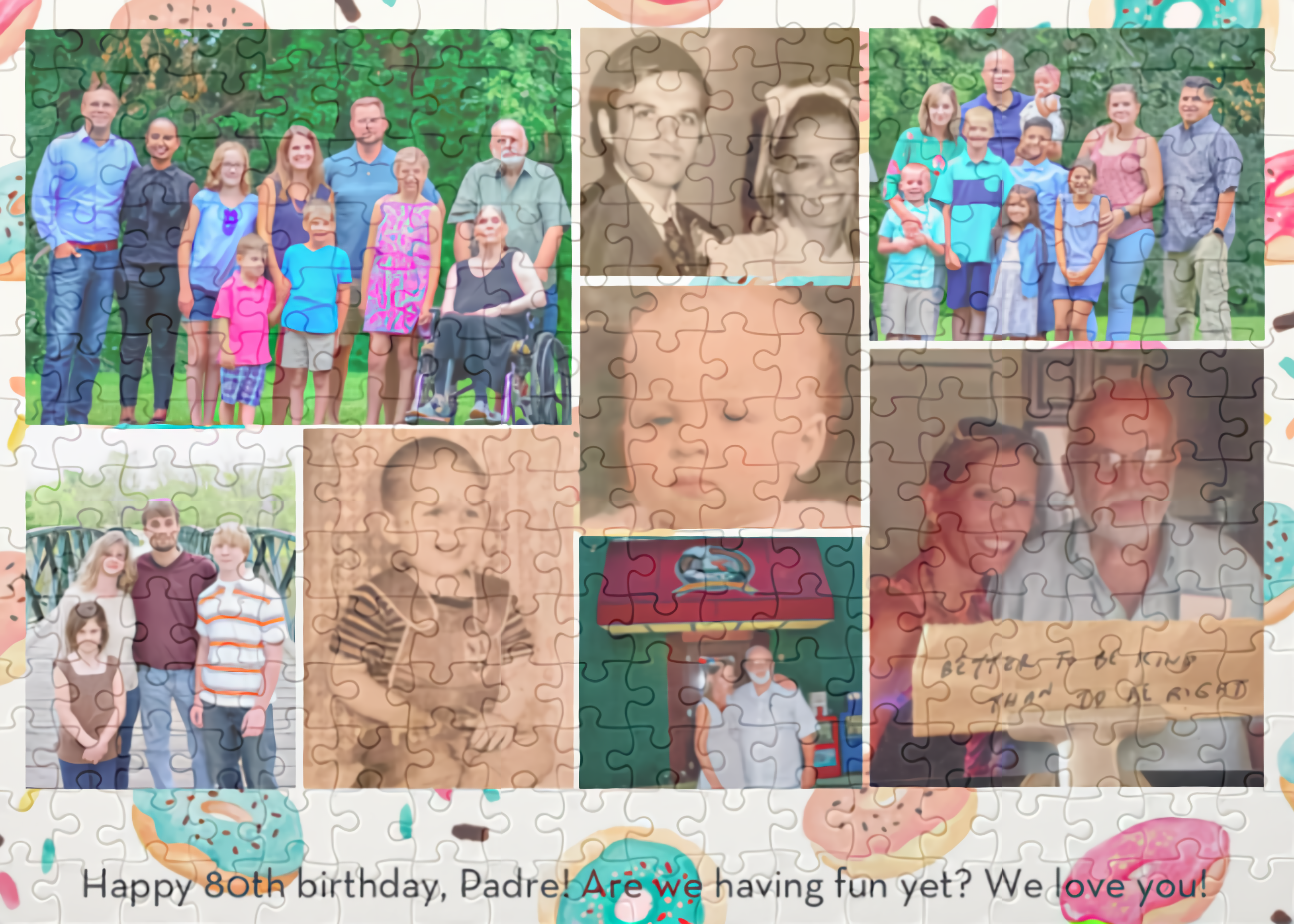
My final gift to my dad for his 80th birthday – appropriately a puzzle, something that dad enjoyed doing as a way to spend time and share presence rather than a task to figure out and finish as quickly as possible. This was the puzzler-in-chief’s way of life.



